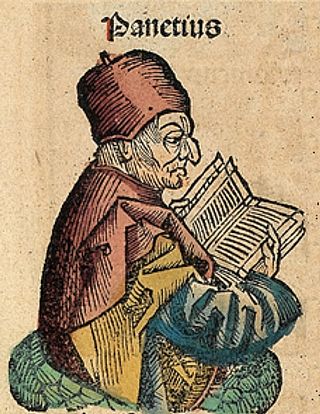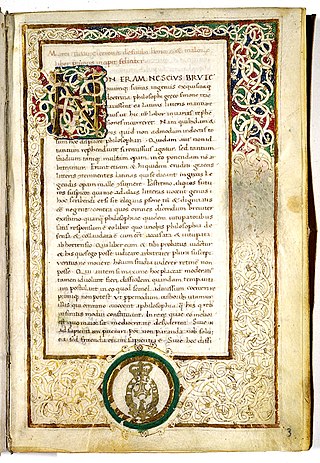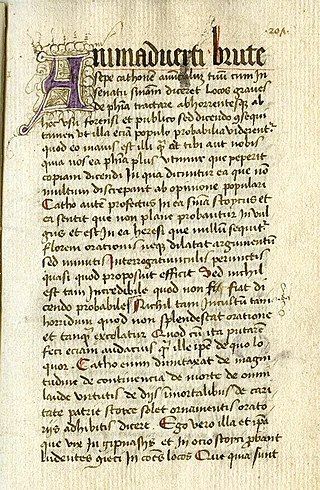Related Research Articles

Zeno of Citium was a Hellenistic philosopher from Citium, Cyprus. Zeno was the founder of the Stoic school of philosophy, which he taught in Athens from about 300 BC. Based on the moral ideas of the Cynics, Stoicism laid great emphasis on goodness and peace of mind gained from living a life of virtue in accordance with nature. It proved very popular, and flourished as one of the major schools of philosophy from the Hellenistic period through to the Roman era, and enjoyed revivals in the Renaissance as Neostoicism and in the current era as Modern Stoicism.

Chrysippus of Soli was a Greek Stoic philosopher. He was a native of Soli, Cilicia, but moved to Athens as a young man, where he became a pupil of the Stoic philosopher Cleanthes. When Cleanthes died, around 230 BC, Chrysippus became the third head of the Stoic school. A prolific writer, Chrysippus expanded the fundamental doctrines of Cleanthes' mentor Zeno of Citium, the founder and first head of the school, which earned him the title of the Second Founder of Stoicism.

Posidonius "of Apameia" or "of Rhodes", was a Greek politician, astronomer, astrologer, geographer, historian, mathematician, and teacher native to Apamea, Syria. He was considered the most learned man of his time and, possibly, of the entire Stoic school. After a period learning Stoic philosophy from Panaetius in Athens, he spent many years in travel and scientific researches in Spain, Africa, Italy, Gaul, Liguria, Sicily and on the eastern shores of the Adriatic. He settled as a teacher at Rhodes where his fame attracted numerous scholars. Next to Panaetius he did most, by writings and personal lectures, to spread Stoicism to the Roman world, and he became well known to many leading men, including Pompey and Cicero.
Eudaimonia is a Greek word literally translating to the state or condition of 'good spirit', and which is commonly translated as 'happiness' or 'welfare'.

Panaetius of Rhodes was an ancient Greek Stoic philosopher. He was a pupil of Diogenes of Babylon and Antipater of Tarsus in Athens, before moving to Rome where he did much to introduce Stoic doctrines to the city, thanks to the patronage of Scipio Aemilianus. After the death of Scipio in 129 BC, he returned to the Stoic school in Athens, and was its last undisputed scholarch. With Panaetius, Stoicism became much more eclectic. His most famous work was his On Duties, the principal source used by Cicero in his own work of the same name.
Aristo of Chios, also spelled Ariston, was a Greek Stoic philosopher and colleague of Zeno of Citium. He outlined a system of Stoic philosophy that was, in many ways, closer to earlier Cynic philosophy. He rejected the logical and physical sides of philosophy endorsed by Zeno and emphasized ethics. Although agreeing with Zeno that Virtue was the supreme good, he rejected the idea that morally indifferent things such as health and wealth could be ranked according to whether they are naturally preferred. An important philosopher in his day, his views were eventually marginalized by Zeno's successors.
Antiochus of Ascalon was an Academic philosopher. He was a pupil of Philo of Larissa at the Academy, but he diverged from the Academic skepticism of Philo and his predecessors. He was a teacher of Cicero, and the first of a new breed of eclectics among the Platonists; he endeavoured to bring the doctrines of the Stoics and the Peripatetics into Platonism, and stated, in opposition to Philo, that the mind could distinguish true from false. In doing so, he claimed to be reviving the doctrines of the Old Academy. With him began the phase of philosophy known as Middle Platonism.
Diogenes of Babylon was a Stoic philosopher. He was the head of the Stoic school in Athens, and he was one of three philosophers sent to Rome in 155 BC. He wrote many works, but none of his writings survived, except as quotations by later writers.
Critolaus of Phaselis was a Greek philosopher of the Peripatetic school. He was one of three philosophers sent to Rome in 155 BC, where their doctrines fascinated the citizens, but frightened the more conservative statesmen. None of his writings survive. He was interested in rhetoric and ethics, and considered pleasure to be an evil. He maintained the Aristotelian doctrine of the eternity of the world, and of the human race in general, directing his arguments against the Stoics.
Stoic passions are various forms of emotional suffering in Stoicism, a school of Hellenistic philosophy.

Hellenistic philosophy is Ancient Greek philosophy corresponding to the Hellenistic period in Ancient Greece, from the death of Alexander the Great in 323 BC to the Battle of Actium in 31 BC. The dominant schools of this period were the Stoics, the Epicureans and the Skeptics.
Herillus of Chalcedon, was a Stoic philosopher and a pupil of Zeno of Citium.
Glossary of terms commonly found in Stoic philosophy.
This page is a list of topics in ancient philosophy.
Stoicism is a school of Hellenistic philosophy founded by Zeno of Citium in Athens in the early 3rd century BCE. It is a philosophy of personal virtue ethics informed by its system of logic and its views on the natural world, asserting that the practice of virtue is both necessary and sufficient to achieve eudaimonia : one flourishes by living an ethical life. The Stoics identified the path to eudaimonia with a life spent practicing virtue and living in accordance with nature.
A sage, in classical philosophy, is someone who has attained wisdom. The term has also been used interchangeably with a 'good person', and a 'virtuous person'. Among the earliest accounts of the sage begin with Empedocles' Sphairos. Horace describes the Sphairos as "Completely within itself, well-rounded and spherical, so that nothing extraneous can adhere to it, because of its smooth and polished surface." Alternatively, the sage is one who lives "according to an ideal which transcends the everyday."

De finibus bonorum et malorum is a Socratic dialogue by the Roman orator, politician, and Academic Skeptic philosopher Marcus Tullius Cicero. It consists of three dialogues, over five books, in which Cicero discusses the philosophical views of Epicureanism, Stoicism, and the Platonism of Antiochus of Ascalon which supports a hybrid system of Platonism, Aristotelianism, and Stoicism. The treatise is structured so that each philosophical system is described in its own book, and then disputed in the following book. The book was developed in the summer of the year 45 BC, and was written over the course of about one and a half months. Together with the Tusculanae Quaestiones written shortly afterwards and the Academica, De finibus bonorum et malorum is one of the most extensive philosophical works of Cicero.

The philosophy of happiness is the philosophical concern with the existence, nature, and attainment of happiness. Some philosophers believe happiness can be understood as the moral goal of life or as an aspect of chance; indeed, in most European languages the term happiness is synonymous with luck. Thus, philosophers usually explicate on happiness as either a state of mind, or a life that goes well for the person leading it. Given the pragmatic concern for the attainment of happiness, research in psychology has guided many modern day philosophers in developing their theories.

Lucius Manlius Torquatus was a Roman politician and military commander. He was active during the Crisis of the Roman Republic and Caesar's Civil War. He commanded troops at the battles of Oricum, Dyrrhachium and Thapsus. The last of these ended the war, in a defeat for the faction Torquatus supported; he escaped the field, but was captured and killed shortly after. He is portrayed by Cicero in De Finibus as a spokesman advocating Epicurean ethics.

The Paradoxa Stoicorum is a work by the academic skeptic philosopher Cicero in which he attempts to explain six famous Stoic sayings that appear to go against common understanding: (1) virtue is the sole good; (2) virtue is the sole requisite for happiness; (3) all good deeds are equally virtuous and all bad deeds equally vicious; (4) all fools are mad; (5) only the wise are free, whereas all fools are enslaved; and (6) only the wise are rich.
References
- 1 2 Nova Roma, interview of A. Poliseno, "Stoicism in Ancient Rome",
- ↑ Section 2: Hellenistic and Roman Ethics Archived 2007-07-29 at the Wayback Machine
- ↑ Two Concepts of Morality: A Distinction of Adam Smith's Ethics and its Stoic Origin, extract on Jstor
- ↑ Stobaeus, in Long, A. A.; Sedley, D. N. (1987). The Hellenistic Philosophers: vol. 1. translations of the principal sources with philosophical commentary, 59B. Cambridge, England: Cambridge University Press (SVF III, 494)
- ↑ Plutarch, On Stoic Self-Contradictions, in Moralia , 1046 E–F (SVF III, 299, 243 – see Long & Sedley, 1987, 61F)
- ↑ Review of Keimpe Algra, Jonathan Barnes, Jaap Mansfeld, Malcolm Schofield, The Cambridge History of Hellenistic Philosophy. Cambridge: Cambridge University Press, 1999. pp. xix + 916. ISBN 0521250285.
- ↑ Long & Sedley, 1987, 59K
- ↑ Cicero wrote: "quod autem ratione est, id officium appellamus; est igitur officium eius generis, quod nec in bonis ponatur nec in contrariis, in De Finibus Bonorum et Malorum , III, 58.[ clarification needed ]
- ↑ Diogenes Laërtius, Lives and Opinions of Eminent Philosophers , VII, 108–109 (SVF III, 495, 496; transl. in Long, A. A.; Sedley, D. N. (1987), 59E)